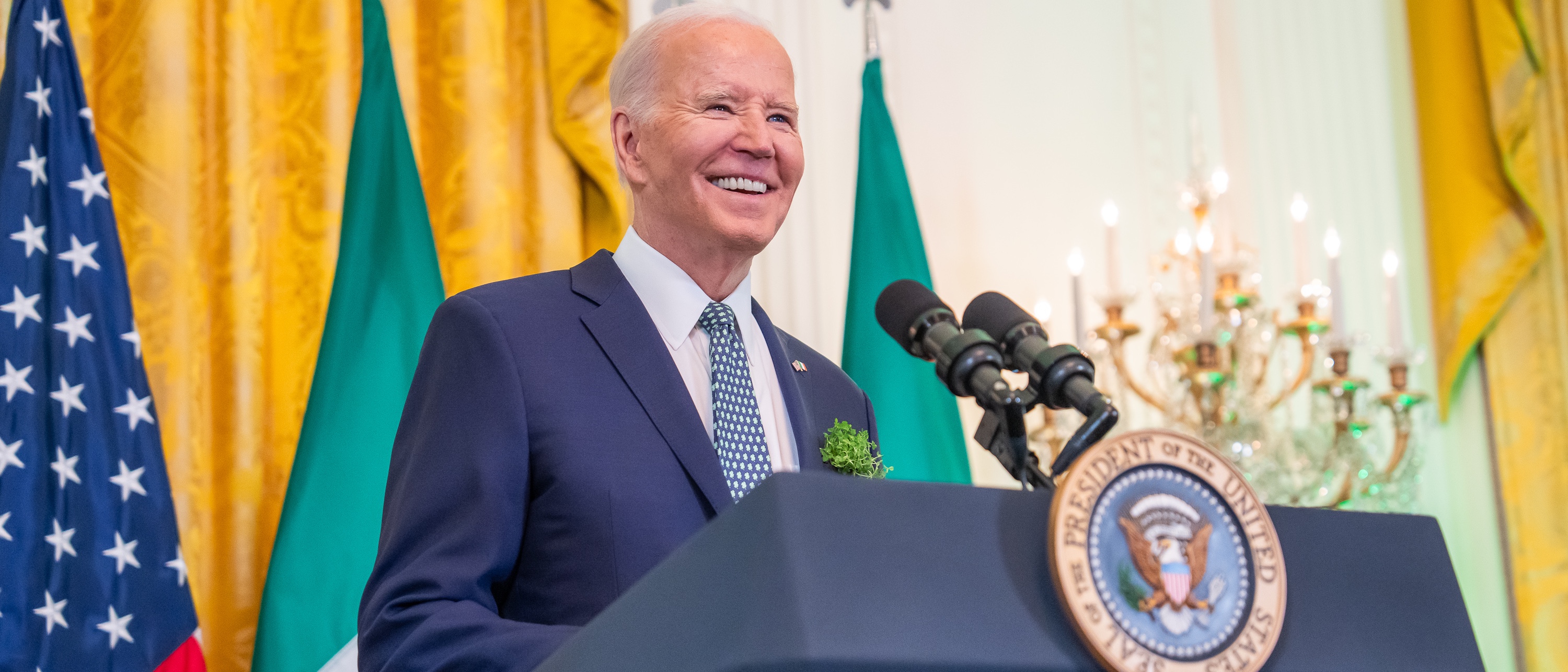Commentary: Big Tent Ideas
MORGAN MURPHY: The Ukraine Blame Game Begins

(Official White House Photo by Adam Schultz)
Congress stands poised to deliver another $60 billion in aid to Ukraine atop the $111 billion in prior packages. President Biden has pushed for these bills and is expected to sign them.
Just this latest figure is a staggering sum, enough to build 10 Columbia-class nuclear submarines to add to our ailing Navy, where 40 percent of our existing attack submarines cannot get out of dry dock due to maintenance backlogs.
It brings to mind the adage by 18th-century Scottish historian Alexander Tytler, “a democracy always collapses over loose fiscal policy.”
At present, the U.S. fisc is looser than a night of Netflix and chill in Las Vegas.
When asked about Ukraine funding in December last year, Secretary of State Antony Blinken told a reporter, “there is no magic pot of money that we can draw from.”
Except it appears there is.
For more than a year the Office of Management and Budget dithered in answering Congress about Ukraine funding. Just last week, Senator J.D. Vance led 16 Republicans in asking OMB for a full accounting of money given to Ukraine. Turns out the Biden administration—whoops—sent $14 billion more than Congress authorized, bringing the total to $125 billion.
Instead of punishing the Biden administration’s staggering incompetence and fiduciary malfeasance, it seems Congress will reward it, bringing the Ukraine grab bag to $185 billion by next week.
A poll this month from the Heritage Foundation found that 56 percent of Americans in battleground states believe we’ve already given too much to Ukraine. Only 12 percent of respondents think we haven’t done enough.
So what explains Congress’ actions in light of looming voter disgust? Signs point to jitters about who’ll get the blame in the likely event that Ukraine suffers major defeats this spring or summer.
To make sense of this, one has to consider the two main arguments for American intervention. The first contends that without U.S. money and weapons, Ukraine might be crushed and Vladimir Putin will then subsequently reassemble the U.S.S.R. The second argument has a more Machiavellian ring: Ukraine supplies the warm bodies to put American warheads on Russian foreheads. The goal? Destabilize Russia. Maybe regime change.
Does Putin really want to roll over Europe? Neocons like former National Security Advisor John Bolton like to partially quote Putin’s April 2005 speech, where he referred to the collapse of the U.S.S.R. as “the greatest geopolitical disaster of the 20th century.” Warhawks leave out the part of the quote where Putin went on to lament the resulting mass poverty and social paralysis that led many to believe, “our young democracy was not a continuation of Russian statehood, but its ultimate collapse, the prolonged agony of the Soviet system.”
When asked this year directly by Tucker Carlson in his February 6th interview if he could imagine a situation in which Russia attacked Poland, Putin responded, “Only in one case, if Poland attacks Russia. Why? Because we have no interest in Poland, Latvia or anywhere else. Why would we do that? We simply don’t have any interest.”
But perhaps the strongest indicator that Putin doesn’t plan to march on NATO comes from several nations that would be the first to roll back under the iron curtain. Polls like this one and this one have shown majorities in Romania, Bulgaria, Slovakia, Hungary, and Latvia don’t fear Russia.
And what about the argument that we’re destroying Russia’s military and crippling its economy on the cheap? First of all, nearly $300 billion in allied aid and almost 500,000 deaths make this one of the most expensive and bloodiest wars in history.
Gen. Christopher G. Cavoli, the top U.S. commander in Europe, testified this month that Russia now boasts more soldiers than they did at the war’s outbreak. The Russian economy has increased production of armored vehicles by four times, the supply of tanks five times, and drones and artillery shells 17 times. That doesn’t sound like an enemy on the ropes.
In the face of a resurgent Kremlin, the Biden administration has presented no path to victory, stalemate, or negotiation. Its plan seems to be keep writing checks.
Yet the cold calculus of war is unforgiving. Usually the victory goes to the country with a greater population and industrial capacity. Russians outnumber Ukrainians at least five-to-one and Moscow is outproducing the U.S. and Europe combined in the king of the battlefield—artillery.
It’s a fair question for American taxpayers to ask: “Is this $60 billion for Ukraine or for U.S. politicians to say they have clean hands if Russia wins this summer?”
Morgan Murphy is a former DoD press secretary, national security adviser in the U.S. Senate, a veteran of Afghanistan.
The views and opinions expressed in this commentary are those of the author and do not reflect the official position of the Daily Caller News Foundation.
All content created by the Daily Caller News Foundation, an independent and nonpartisan newswire service, is available without charge to any legitimate news publisher that can provide a large audience. All republished articles must include our logo, our reporter’s byline and their DCNF affiliation. For any questions about our guidelines or partnering with us, please contact [email protected].

